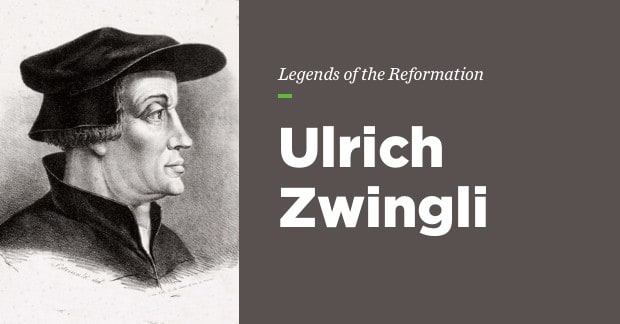In almost any discussion of the Reformation, Luther’s name comes up first—as it should.
Or should it?
Meet Ulrich (sometimes spelled Huldrych) Zwingli, one of the three most well-known Reformers. Zwingli helped the Reformation take root in Switzerland, even before John Calvin, Switzerland’s most famous Reformer, arrived in the country.
The ‘people’s priest’ of Zurich
This excerpt from Reading Scripture with the Reformers gives you a brief introduction to the great Reformer.
When one visits the famous Great Minster Church in Zurich today, the following inscription can be read over the portal: “The Reformation of Huldrych Zwingli began here on January 1, 1519.” That date, no less than October 31, 1517, can be given as an answer to the question, When did the Reformation begin?
On that first day in January, which happened to be Zwingli’s birthday, the new “people’s priest” of Zurich began his preaching ministry by announcing his intention to dispense with the prescribed texts of the traditional lectionary. He would follow a new paradigm: preaching expositional sermons, chapter by chapter, starting with the Gospel of Matthew. . . .
What was Zwingli like as a preacher? Only a few of his sermons were published in his lifetime and much that remains is in the form of incomplete notes. But we do have several reports of his preaching that would seem to justify our calling him, in the words of Lee Palmer Wandel, “one of the most charismatic and effective preachers of an age of preachers.”
Whether he started the Reformation on January 1 or Luther started it on October 31, these thoughts from Zwingli are helpful for growing Christians every day of the year.
Zwingli on surrendering to Christ
I ask Christ for this one thing only, that he will enable me to endure all things courageously, and that he break me as a potter’s vessel or make me strong, as it pleases him.
— From Huldreich Zwingli: The Reformer of German Switzerland by Samuel Macauley Jackson
You are God’s tool. He wills to wear you out by use, not by idleness. Oh, happy man, whom he calls to His work!
— From The Latin Works and the Correspondence of Huldreich Zwingli, vol. 2
Zwingli on the sufficiency of Christ
I shall not withhold from you, dear brethren in Christ Jesus, how it was I arrived at the firm conviction that we need no other mediator than Christ, and that none but Christ alone can mediate between God and man. Eight or nine years ago I read a poem of Erasmus, of Rotterdam, on the Lord Jesus, wherein Jesus complains that men do not seek all good from him, who is the source of all good, the Savior, Refuge, and Treasure of the soul. Whereupon I reflected, “If that is so, why then do we seek help from any creature?”
— From Life of Ulrich Zwingli, the Swiss Patriot and Reformer by Samuel Simpson
Zwingli on truth
The business of the truth is not to be deserted, even to the sacrifice of our lives. For we live not for this age of ours, nor for the princes, but for the Lord. To admit for the sake of the princes any thing that will diminish or vitiate the truth is silly, not to say impious. To have held fast to the purpose of the Lord is to conquer all adversaries.
— From Huldreich Zwingli: The Reformer of German Switzerland
Whom then am I to follow? Unless one be a fool he will reply, “Those who have been enlightened by the Spirit of God; for whatever comes of human wisdom, however beautiful it seems, may deceive; divine truth, never.”
— From Life of Ulrich Zwingli, the Swiss Patriot and Reformer by Samuel Simpson
Zwingli on quarrels
How does it happen that we Christians who are united by such powerful agencies have much greater quarrels than unbelievers? And how does it happen that in a Confederacy in which until now a fraternal love prevailed, for the sake of foreign lords violent quarrel has arisen? Answer: Real piety, by which is meant true worship and prayer to God, has disappeared among us, as St. Paul writes to the Romans (Rom 1:28–31).
— From The Latin Works and The Correspondence of Huldreich Zwingli, vol. 1
I would seek to win not by violent opposition, but by kindliness.
— From Life of Ulrich Zwingli, the Swiss Patriot and Reformer by Samuel Simpson
Zwingli on God’s providence
The providence of God provides all things, orders all things, upholds all things; for, of two sparrows bought for a farthing, one does not fall to the ground without the providence of God, who has numbered the very hairs of our heads. His care and watchfulness surely do not diminish when the object for which God cares is small or insignificant.
— From The Christian Education of Youth by Ulrich Zwingli
For more quotes from Zwingli and the Reformers, pick up 300 Quotations for Preachers from the Reformation, Pastorum Series (Bellingham, WA: Lexham Press, 2013).
Get to know Zwingli even better through The Works of Zwingli (7 vols.).







